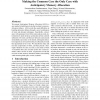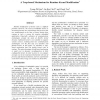129
click to vote
ASPLOS
2012
ACM
13 years 10 months ago
2012
ACM
Device drivers are the single largest contributor to operating-system kernel code with over 5 million lines of code in the Linux kernel, and cause significant complexity, bugs an...
232
click to vote
FAST
2011
14 years 5 months ago
2011
We present Anticipatory Memory Allocation (AMA), a new method to build kernel code that is robust to memoryallocation failures. AMA avoids the usual difficulties in handling allo...
IEEECIT
2006
IEEE
15 years 8 months ago
2006
IEEE
Runtime modification of kernel code is a difficult problem. However, the need of modifiable kernel is increasing because new requirements and services that are unanticipated at th...
118
click to vote
SP
2007
IEEE
15 years 8 months ago
2007
IEEE
The integrity of kernel code and data is fundamental to the integrity of the computer system. Tampering with the kernel data is an attractive venue for rootkit writers since malic...
105
click to vote
ACSAC
2008
IEEE
15 years 8 months ago
2008
IEEE
A new class of stealthy kernel-level malware, called transient kernel control flow attacks, uses dynamic soft timers to achieve significant work while avoiding any persistent ch...
132
click to vote
ACSAC
2009
IEEE
15 years 9 months ago
2009
IEEE
Abstract—The traditional virtual machine usage model advocates placing security mechanisms in a trusted VM layer and letting the untrusted guest OS run unaware of the presence of...


